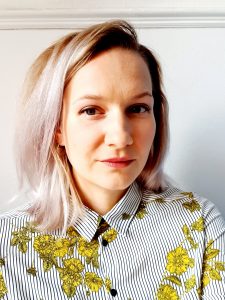May 5, 2021, by Postgraduate Placements Nottingham
My UKRI Policy Internship with the Royal Society
This week’s blog comes from Martina Sykorova, ESRC PhD student, School of Health Sciences
This blog is for PhD students who would like to explore career options outside academia, such as in the policy sector.
I am a PhD student who is jointly funded by the Economic and Social Research Council and by industry (Smith & Nephew Healthcare). I am based at the School of Health Sciences – I am, however, not a clinician by background. My background is in public health.
A lot of PhD students based at the School of Health Sciences seek to continue on as postdocs, or to become clinical academics. I was curious about exploring career options available to PhD students upon the completion of their studies; I became aware of the UK Research and Innovation (UKRI) Policy Internship Scheme and decided to apply for a placement with the Royal Society in the 3rd year of my PhD, during my writing-up period.
I have always been curious about the Royal Society as an organisation. The Royal Society was founded in 1660 and provides an independent and evidence-based scientific advice to national and international policy makers. After submitting my application (which included a written policy brief), I was invited for an interview in London and was later offered the position as the UKRI intern. I was very excited about it, to say the least! Unfortunately, my internship had to be postponed twice due to the Covid19 pandemic; in the end, it was possible to undertake the placement remotely.
My internship exceeded all my expectations. As a health/social science researcher, I was always interested in how research findings are translated into practice; I have, however, been even more curious about the next step, i.e. how research findings are translated into policy. Research impact can be limited, but policy has the potential to impact large areas and populations at a regional, national or even international level.
I was placed in the Royal Society’s Wellbeing Policy Team and assigned to work on the Living Landscapes Programme, which is currently focusing on the Multifunctional Landscapes Project. The aim of the project is to explore different types of land use, how the same land can deliver multiple outcomes and how this evidence can be translated into UK land use policy. The Living Landscapes Programme is led by two policy advisors who were both incredibly supportive and helpful.
The first couple of weeks of my internship could be described as a steep learning curve. It involved searching a lot of terms I was not familiar with, such as ‘peatland’ and ‘bog’. I have never done environmental science before, but I found it very enjoyable to learn about land use and the environment.
My role mainly involved activities that any PhD student will be familiar with: evidence searching, gathering and analysis. I spent the first five weeks of my internship reviewing and analysing national policies relating to land use and the environment in England, Wales, Scotland and Northern Ireland. Policy work does not get any more ‘hard core’ than this! The remaining eight weeks of my internship were focused on literature searching, evidence gathering and evidence summarising; these fed into the final project report, which will be published in autumn 2021. Research topics ranged from sustainable intensification of agriculture to the social science of behavioural change. Throughout my internship I have also attended many meetings with various governmental and non-governmental organisations, which were excellent opportunities to observe how policy advisors work ‘on the ground’. One thing I have learnt about the policy world is that everything is fast-paced, e.g. policy reports are published much quicker than academic research. On specific occasions, think-tanks are given a few days or weeks to advise government on certain policy topics. It was also very useful to learn about different writing styles, e.g. academic vs. policy.
The Royal Society staff made me feel very welcome and agreed to be ‘interviewed’ about their career paths. I was given many useful career tips on work within the policy and public sectors, and where to look for policy jobs after the completion of my PhD.
I would strongly encourage all PhD students to apply for the UKRI Policy Internship Scheme because gaining policy experience during a PhD is much rarer than gaining research or teaching experience. Prior to my internship, I had not considered the policy sector as one of the potential career options – this has now changed!
*I would like to say huge thanks to Zoe Davies and Dr Jamie Upton from the Royal Society for welcoming me to their team, an absolute dream team to work with!
“Many of the skills needed for policy and PhDs are the same – research, analysis, consolidation and communication of evidence. It is always a pleasure to introduce PhD researchers to the world of policy, especially when they had not considered it as a career option before. Though she had no prior experience in policy or environmental science, Martina took to the job like a duck to water and quickly became an indispensable part of our small team. She has a bright future ahead of her in policy if she chooses, and I would very much encourage her, and other PhD students, to pursue it.”
~ Zoe Davies, Senior Policy Advisor, Royal Society


Thank you Martina
I am very proud to see your talent and to be part of your phd supervision team